Solomon Islands launch of the new Pacific Partnership to End Violence Against Women and Girls
Date:

JOINT MEDIA RELEASE
(Honiara, Solomon Islands) – The new Pacific Partnership to End Violence Against Women and Girls (Pacific Partnership) programme is being launched nationally in Honiara today.
Solomon Islands will benefit from the regional EUR19.5million Pacific Partnership programme (valued at SBD$178m) funded primarily by the European Union (EUR12.7m) with targeted support from the Australian Government (EUR6.2m) and cost-sharing from UN Women (EUR0.6m). Targeted support from Australia has expanded the investment in Solomon Islands.
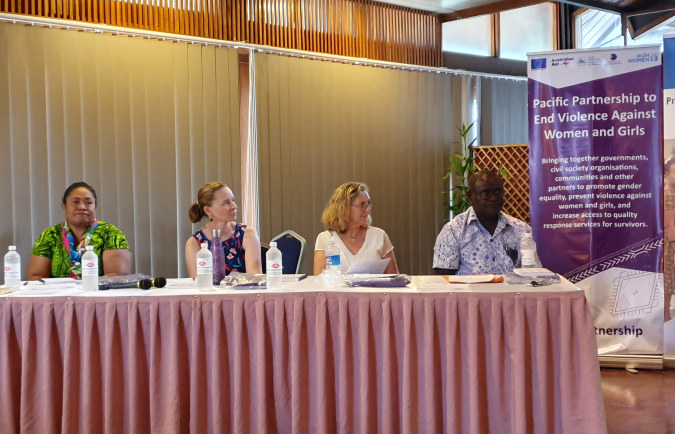
The Pacific Partnership marks a continuation of support by donor and technical partners for initiatives that support survivors of sexual and gender-based violence (GBV) in Solomon Islands, where 64 per cent[1] of the nation’s women experience physical or sexual intimate partner violence - twice the global average.
Dr Cedric Alependava, Permanent Secretary for the Ministry of Women, Youth, Children and Family Affairs (MWYCFA) said: “The Solomon Islands Government is pleased to welcome this programme and to work together with the Pacific Partnership to End Violence Against Women and Girls.”
“Whilst the Pacific Partnership is new, the support from its partners to the Solomon Islands government and civil society has existed for more than a decade – this links with a long-term and valuable collaboration to stop GBV that is further cemented through this commitment by the Australian Government and European Union funded Pacific Partnership programme.”
“We believe that being a priority country in this Pacific Partnership reflects the national commitments and groundswell of support by the Solomon Islands government and stakeholders to make our nation a place where sexual and domestic violence is not tolerated and is rejected by everyone in our communities.”
The Pacific Partnership brings together government, civil society organisations, communities and other partners to promote gender equality, prevent violence against women and girls (VAWG), and increase access to quality response services for survivors. The programme will build on the many years of VAWG work by civil society and government to address this issue.
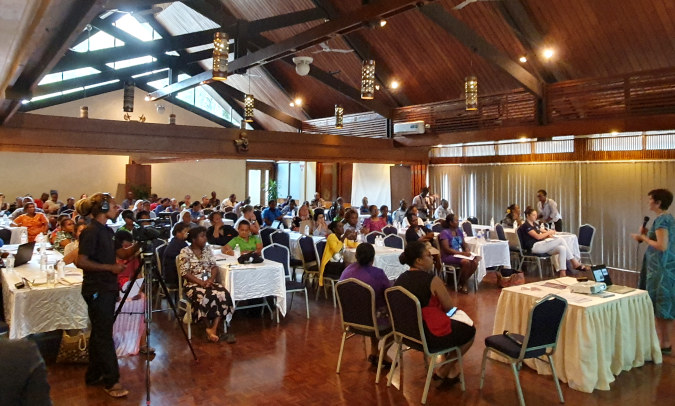
It has three components, jointly coordinated by the Pacific Community (SPC) Regional Rights Resource Team (RRRT), Pacific Islands Forum Secretariat (PIFS) and UN Women Fiji Multi-Country Office.
The majority of the Solomon Islands programme is under UN Women’s component to strengthen access to quality response services for survivors, and the PIFS component to empower civil society organisations to advocate and report on government commitments to end VAWG. SPC RRRT technical support is available on demand for their area of work to strengthen formal and informal education around human rights, social citizenship and respectful relationships.
The Head of Cooperation at the EU Delegation for the Pacific, Christoph Wagner, based in Suva, said: “Gender equality is also at the core of our continuous engagement with partner countries worldwide. The EU is striving to accelerate the efforts towards gender equality in the different fields, as part of the implementation of the Sustainable Development Goals.”
“All around the world, we remain strongly committed to implement actions fighting all forms of violence against women and girls. We are committed to giving all women and girls equal access to services, education and economic empowerment, and the opportunities to shape their own future,'' Mr Wagner said.
Speaking at the launch in Honiara, Australia’s Counsellor, Human Development, Julie McCallum, highlighted Australia’s broad and enduring support, through targeted financial and technical assistance, to both MWYCFA and UN Women, to end violence against women and girls.
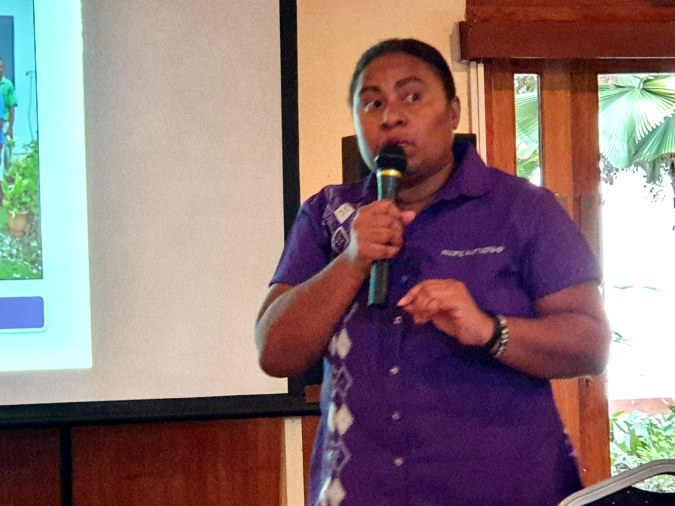
“A key priority for Australia is maintaining the focus on Solomon Islands women and girls, and to enhance an environment that supports them to access better quality and more coordinated response the referral services,” Ms McCallum said.
“Supporting the rollout of SAFENET to every province, and the development of the National Counselling Framework are key priorities under the new Pacific Partnership, and Australia is proud to be supporting these initiatives.”
In partnership with UN Women, key initiatives in Solomon Islands under the Pacific Partnership include support to: MWYCFA for the roll-out of SAFENET to four provinces; MWYCFA for the development and implementation of the national domestic violence counselling frame work over several years; and to the Family Support Centre’s counselling services based in Honiara and across three provinces.
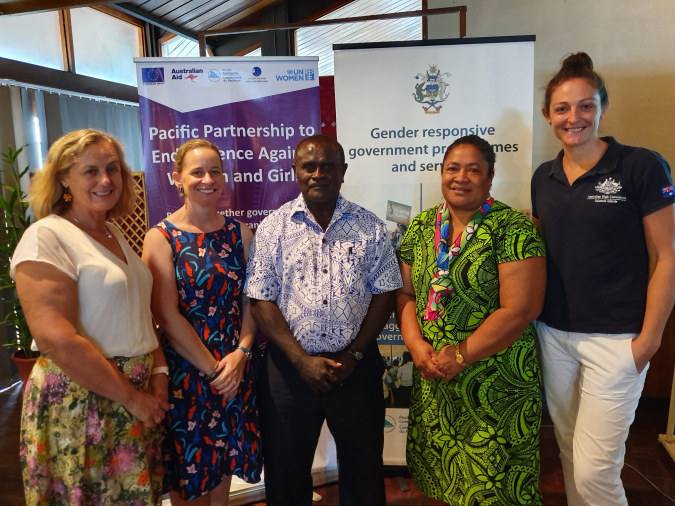
UN Women Fiji MCO Deputy Representative, Sarah Boxall, explained how: “through the Pacific Partnership, UN Women continues to build a strong, long-term commitment to support the Solomon Islands government and civil society partners working to end gender-based violence while assisting survivors with improved access to quality services to help them heal.”
“The support started prior to launching the Pacific Regional Ending Violence Against Women Facility Fund (Pacific Fund) in 2009, funded by the Australian Government, then advanced to the UN-Solomon Islands Government Joint Programme and the UN Essential Services Programme (ESP) – and now the Pacific Partnership in collaboration with SPC, PIFS and donors from the Australian Government and European Union.”
In Solomon Islands, the Pacific Partnership aims to ensure survivors have access to quality response services, and to support national and regional institutions to meet their commitments to gender equality and the prevention of violence against women.
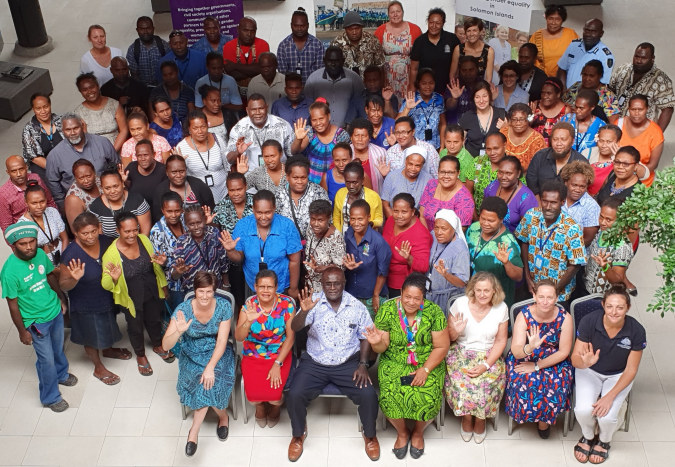
In addition to Solomon Islands, the five-year programme (2018-2022) targets countries and territories in the Pacific region including, but not limited to, Fiji, Kiribati, Papua New Guinea, Republic of the Marshall Islands, Samoa, Tonga, Tuvalu, and Vanuatu.
Media enquiries should be directed to:
- Jacqui Berrell, UN Women Fiji MCO, Ph: Solomon Islands: +717 9557 Fiji: +679 9429 141 E:jacqui.berrell@unwomen.org
- Grace Williams, Australian High Commission, Solomon Islands, +677 21561 ext 278; grace.williams@dfat.gov.au (or for regional media: Dawn Gibson, Email: Dawn.Gibson@dfat.gov.au)
- European Union (EU), Ph: +679 3313 633, Kamni Narayan, Kamni.NARAYAN@eeas.europa.eu, ext 115 or Mohammed-Nazeem Kasim, Mohammed-Nazeem.KASIM@eeas.europa.eu Mobile: +679 9920 597
BACKGROUND:
The Pacific region has some of the highest rates of violence against women recorded in the world – twice the global average with an estimated two in every three Pacific women impacted by gender-based violence. Along with high rates of violence – a violation of human rights – women and girls in the Pacific region experience constant and continual inequalities including low levels of participation in decision making, limited economic opportunities, restricted access to rights.
The Pacific Partnership to End Violence Against Women and Girls (Pacific Partnership) brings together governments, civil society organisations, communities and other partners to promote gender equality, prevent violence against women and girls (VAWG), and increase access to quality response services for survivors.
To achieve this, the Pacific Partnership aims to transform the social norms that allow violence against women and girls to continue; to ensure survivors have access to quality response services; and to support national and regional institutions to meet their commitments to gender equality and prevention of violence against women and girls. Working through partners, it will promote equal rights and opportunities for all Pacific people, through innovative approaches to education, access to essential services, and policy development.
The EUR 19.5million partnership is funded primarily by the European Union (EUR 12.7m) that supports all three outcome areas of the programme, with the Australian Government providing targeted funding to the second outcome (EUR 6.2m or AUD 7.6m) with cost-sharing from UN Women (EUR 0.6m or USD 0.75m). Australia is the leading partner in Solomon Islands. The programme’s three outcome areas are jointly implemented through a partnership between the Pacific Community (SPC) Regional Rights Resource Team (RRRT), Pacific Islands Forum Secretariat (Forum Secretariat) and UN Women Fiji Multi-Country Office (MCO).
The three key outcomes, or components, are:
- A key outcome of the programme aims to enhance Pacific youth’s formal in-school and informal education on gender equality and prevention of violence against women and girls. This outcome is funded by the European Union (EU) and led by SPC RRRT.
- A key outcome of the programme aims to promote gender equitable social norms at individual and community levels to prevent violence against women and girls, and to ensure survivors have access to quality response services. This outcome is funded by the European Union (EU) and Australian Government with support from the UN Women Fiji MCO that is also the coordinating agency.
- A key outcome of the programme focuses on empowering national and regional civil society organisations (CSOs) to advocate, monitor and report on regional institutions and governments commitments to enhance gender equality and prevent violence against women and girls. This outcome is funded by the EU and implemented by the Forum Secretariat.
The five-year programme (2018-2022) targets countries and territories in the Pacific region including, but not limited to, Fiji, Kiribati, Papua New Guinea, Republic of the Marshall Islands, Samoa, Solomon Islands, Tonga, Tuvalu and Vanuatu.
Resources: [1] Findings from the Solomon Islands Family Health and Safety Studies (FHSS): A study on violence against women and children. Conducted by UNFPA and the Pacific Community (SPC) across 11 Pacific countries including Solomon Islands. Studies are online: http://pacific.unfpa.org/en/publications?page=0%2C1 The 2009 Family Health and Safety study found that 64% of Solomon islands women aged 15 to 49 who have ever been in a relationship reported experiencing physical and/ or sexual violence by an intimate partner, while 29% reported violence from someone other than an intimate partner. Violence against girls is also prevalent, including commercial sexual exploitation associated with the logging, tourism and fishing industries.